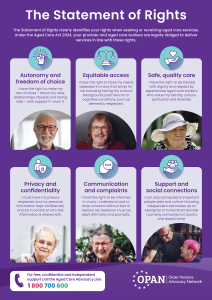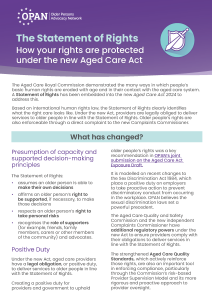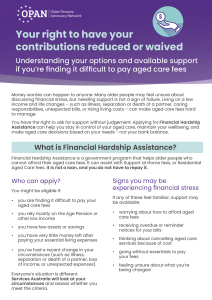
Updated as of: 1 November 2025
The Australian Parliament passed the Aged Care Bill 2024 on 25 November 2024, with the new rights-based Aged Care Act ultimately commencing on 1 November 2025.
OPAN has identified 7 key areas of change under the new Aged Care Act, summarised below.
You will also find handy links to resources and fact sheets to help you better navigate and understand the upcoming changes.
The Big Q&A
Your top 20 questions answered from our recent webinar series: What the new Aged Care Act means for you
7 key changes for older people
1. A rights-based focus
The new Act introduces a Statement of Rights*, which outlines the rights of older people when seeking or accessing government-funded aged care services. It includes rights like independence and autonomy, respect for privacy, safe and quality care, and the right to raise issues without fear of reprisal. Aged care service providers are legally obliged to deliver services to older people in line with the Statement of Rights.
View our webinar on Statement of Rights.

View our poster on the Statement of Rights and real life case studies.
*The Statement of Rights replaces the Charter of Aged Care Rights, which was a voluntary agreement.
View our factsheet on Statement of Rights.
2. Enhanced quality standards
Strengthened Aged Care Quality Standards have been introduced with the commencement of the new Act from 1 November 2025. Aged Care Quality Standards are a set of requirements that define what good care looks like. The strengthened standards will make it clear what older people can expect from aged care service providers and workers. Under the strengthened standards, providers must actively include older people in the planning and management of their care to ensure care is safe, high quality and tailored to the needs of the older person. Care must be delivered in line with the Statement of Rights.
3. Greater protections when you speak up
The new Act increases protections for whistleblowers – people who call out issues. Older people, families, representatives, and aged care workers can report a person or organisation who has not followed aged care law without fear that they will be punished or treated unfairly.
4. Safeguards around decision-making
Under the new Act, older people’s right to make decisions about the care they receive and the risks they are willing to take is enshrined in legislation. The Act acknowledges that some older people may want support in making certain types of decisions, and since coming into effect, older people can register one or more people to assist them. These people are referred to as their supporters. The new Act clearly outlines the role and responsibilities of these registered supporters in upholding the older person’s wishes and preferences. An older person does not have to register a supporter if they don’t want to.
View our webinar on supported decision-making and supporters.
5. An independent complaints process
An independent Complaints Commissioner, appointed by the Minister for Aged Care, promotes the independence, transparency, and accountability of complaints handling by the Aged Care Quality and Safety Commission. An independent complaints process helps to improve the operation of aged care complaints and rebuild the trust of older people that their complaints will be taken seriously and will be resolved in a timely manner.
View our webinar on understanding complaints.
6. A new funding model
Older people are required to make means-tested co-contributions for their non-clinical care under the new Act. There are new hardship measures for older people with limited means.
We have included the most important resources explaining these changes on our ‘useful resources’ page.
The government is applying ‘no worse off’ arrangements so older people who were in the aged care system prior to 12 September 2024, when the Bill was tabled in Parliament, will not be financially disadvantaged because of the changes.
View our webinar on Support at Home costs and fees.
View our webinar on residential aged care costs and fees.
View our fact sheet on how the new Aged Care Act affects what you pay for residential aged care
View our fact sheet on how the new Aged Care Act affects what you pay for in-home aged care.
View our fact sheet on how the new Aged Care Act affects your right to have your contributions reduced or waived
7. A new Support at Home program
The Support at Home program brings together current in-home aged care programs. Support at Home replaces Home Care Packages and the Short-Term Restorative Care Programme from 1 November 2025. The Commonwealth Home Support Programme will transition no earlier than 1 July 2027. Read more about the changes to home care on our ‘useful resources’ page.
If you are transitioning to Support at Home, you can continue receiving services after 1 November 2025 without signing your new service agreement. You have a maximum of 90 days to sign your agreement, and during this time, your provider cannot end your services because you have not yet signed your agreement.
What does this mean for you?
If you have concerns in relation to your aged care, call the Aged Care Advocacy Line on 1800 700 600.
If you are struggling to pay for your aged care costs, you may be eligible for financial hardship assistance through the Australian Government. This support is designed to ensure that older people can continue to access aged care services, even when financial challenges arise through no fault of their own.




